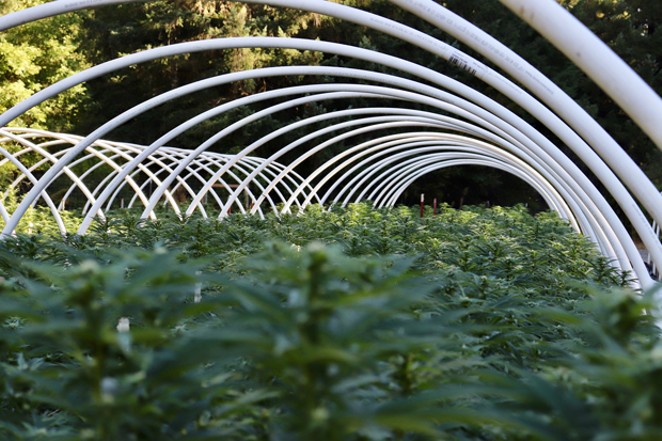In early September the Deschutes County Sheriff's Office raided a 30-acre illegal marijuana farm in Alfalfa. It was the largest marijuana bust in the county's history, and very different from a typical grow in the area.
"Since I started with this, most of our illegal grows are indoor; they're in shops, or they'll actually buy whole houses and adapt them and grow inside and sometimes they rent from people and don't tell them what they're doing," said Danielle Martell, a management analyst at the Deschutes County Sheriff's Office.

The Farms
The Alfalfa farm looked more like one you'd find in Southern Oregon, the northern tip of the fabled Emerald Triangle—a region known for producing some of the highest-quality bud in the world. There, illegal marijuana cultivation is more sophisticated and often more sinister, using cheaply made greenhouses, managed by international criminal organizations.
"Southern Oregon is an ideal place to grow because the growth season is much longer, the temperature is better. They're kind of in a valley that holds that climate," said Dustin Miller, a detective for the DSCO's Marijuana Enforcement division. "The Alfalfa story is what we're seeing in Southern Oregon."
“Cannabis customers are pretty rational economic actors, they respond to the same economic forces that individuals would respond to for other agricultural products or electronic products. So, they think about things like price, they think about things like access, they think about things like risk in terms of that access and they think of quality.”—John Hudak
tweet this
Southern Oregon has recently gotten more aggressive in policing illegal grows. Jackson County declared a state of emergency in October over the proliferation of illegal farms. The Oregon Liquor Control Commission drafted a report that most of the registered hemp grow sites in Jackson and Josephine Counties tested above the legal limit for THC in hemp.
"They've applied so much pressure down there, people are now starting to move out," Miller said. "That doesn't necessarily move to Deschutes County, although Deschutes County has good farmland out east. But we're also seeing them go out towards Lakeview and out towards eastern Oregon."
In Alfalfa cops seized over 9,000 marijuana plants from 49 hoop houses—cheap greenhouses favored by illegal growers. The 20 or so workers growing and processing the marijuana were living in makeshift wooden structures and tents. Some were reportedly working off debt owed to the cartels that operated them. Police also confiscated an AR-15 and two pistols from the property.
"This last year that they've started putting so much pressure on Southern Oregon, we're starting to see more of those hoop houses and stuff show up here in Central Oregon," Miller said.
The operation was labeled a cartel grow in initial reporting, but Miller urged caution about labeling it as such.
"I want to be really careful about using the word 'cartel,' because I don't want to start labeling grows as cartel grows unless we can really prove it. Southern Oregon is where they got hit really hard this year and last year, where people were growing multiple greenhouses," he said.
The large-scale farms are usually on leased land from an owner offered a lot of money up front to grow on their land. Property owners may initially benefit, but often end up with more trouble than it was worth.
"You take the property owner who's like, 'I got this property, I got these water rights, I can turn this into a money maker and I don't have to do anything,'" Miller said. "It's not a pretty green hemp crop like what they were expecting; it's all these greenhouses and a lot of plastic and garbage and soil sacks and fertilizer sacks and different kinds of aftermarket plumbing and electrical."
Black market grow sites mostly supply other states where it's still illegal to possess marijuana. DSCO said illegal grows produce lower-quality cannabis using pesticides that are banned in legal cultivation, and can be sold to children and teenagers that would be excluded from the legal market.
"A large majority of the marijuana being grown in Oregon is not being consumed in Oregon," Miller said. "There are still a lot of states where marijuana is illegal. So, when you have a state that will allow you to grow either commercially, or hemp, or medical, and there's so much of it going on, it's easier to come into Oregon and set up shop, and maybe even get a year or two of production out of it before you get caught."
The Market
On the consumer side, there's a simple explanation for why the illegal market still thrives: consumers tend to do what's best for them.
"Cannabis customers are pretty rational economic actors. They respond to the same economic forces that individuals would respond to for other agricultural products or electronic products," said John Hudak, a senior fellow at the Brookings Institute who studies marijuana. "So, they think about things like price, they think about things like access, they think about things like risk in terms of that access and they think of quality."
Hudak said a lot of the illegal market is operating the same way it did during marijuana prohibition. Legally cultivated and illegally trafficked marijuana exists on a smaller scale, but doesn't move the volume like the large illegal grows.
"I think there's really a legacy system around illegal cannabis. So you have illegal operations in all states, but where it really thrives is where it's thrived for a long time. And that's areas where cannabis can grow naturally quite well, it's areas that have remote locations," Hudak said. "Those operations thrived when California, Oregon, Washington, had no legal system. And so I don't necessarily think that the legal system provides cover."
Black markets that remain in legal states often are bolstered by continued local prohibition on the county level. In August of 2020 Deschutes County placed a moratorium on new applications for marijuana growing and processing facilities. It's the only county in the state that originally legalized cannabis only to later approve such a moratorium.
"Do you want to drive X number of miles to get what might be slightly cheaper or slightly higher quality cannabis? Or do you want to just rely on black market channels?" Hudak said. "One of the things that people don't talk often enough about is that the choices by typically conservative municipalities and counties to opt out of the legal cannabis system helps the black market thrive."
The Workers
Most of the people working the Alfalfa farm were detained and released without criminal charges. DSCO's Miller said that the focus is rarely on the laborers who grow and trim the crop, but on the farm's leaders.
"If we have a location that we're investigating, by the time we hit the door, we usually know who's in charge of the location. And we may discover more hierarchies and be able to put that case together," Miller said.
The Oregon territory once bordered Mexico and has a long history of relying on immigrant labor in agricultural work. Though immigrants usually move somewhere that they have familial connections, University of Oregon anthropology professor Lynn Stephen said those trafficked to work on illegal marijuana farms are often reliant on their traffickers.
"They are the people who are the most desperate, and probably the least connected," Stephen said. "If they're not coming to extended family members, whether it's in Springfield, Eugene, Cottage Grove, Woodburn, Salem, Gresham, Bend or Redmond, if they're not going directly there, and they're being recruited as laborers, then they don't have anyone you know who's watching out for them. So, they're there beholden to whoever transports them there."
Farmworkers don't enjoy the same labor protections as other industries. They're the only laborers in the country who are not legally entitled to overtime pay, who can legally be fired for organizing a union and aren't afforded workers compensation. In an illegal market, these labor practices can be even worse.
"Farmworkers are not protected by the same labor laws as other people. Only a handful of states like California have labor laws for farm recruits. But they're much more limited here," Stephens said. "If they're clandestine, or they're paying people under the table, and if they're in an illegal crop situation, they're not probably concerned with state regulations, whatever they are."
Stephen said that it's difficult to gauge how many farmworkers are undocumented but estimates usually range from 40-50%, and that America's demand for labor and lack of comprehensive immigration reform over the last 30 years create this reality.
"Part of this is because there hasn't been a way for people to become legal for so long, so they haven't been able to leave, because if they leave, they can't come back," Stephen said. "We have deep-seeded multi-generational families, mixed-status families where the kids are citizens, but the parents and the grandparents are still undocumented. And they may have come here as farmworkers like in the late '90s."
The Oregon Legislature dedicated $25 million to combat illegal marijuana grow sites during its special session in December, with $5 million going toward the protection of water rights and the rest establishing a grant program for law enforcement agencies and aiding exploited migrant workers.


























